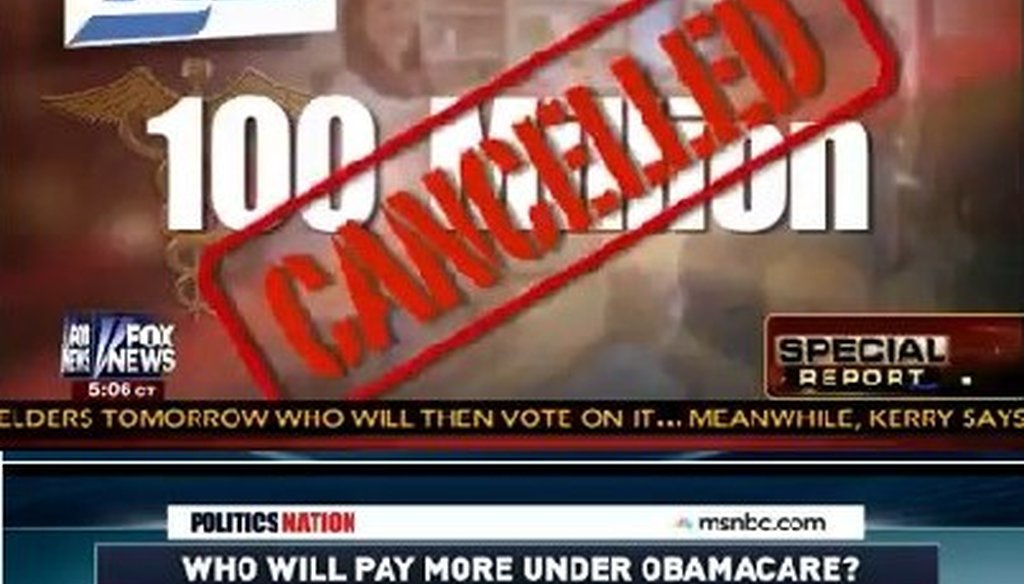Stand up for the facts!
Our only agenda is to publish the truth so you can be an informed participant in democracy.
We need your help.
I would like to contribute

Two graphics aired within 20 seconds of each other on Fox News and MSNBC highlight the confusion in understanding the effects of the health care law.
Two television graphics, two cable networks, within 30 seconds of each other Wednesday night.
One, on Fox News, saying 100 million health insurance policies will be canceled. The other, on MSNBC, saying 80 percent of health care policies will be unaffected by the law.
Logic dictates that both can't be right.
But which one is wrong?
The Fox News estimate comes from an American Enterprise Institute analysis and is focused on employees who receive health insurance through their business. According to AEI, a conservative think-tank that has opposed the health care law, businesses will see their policies canceled starting next year because of new minimum health care standards.
Sign up for PolitiFact texts
MSNBC's figure comes from Jonathan Gruber, an M.I.T. economist and one of the architects of the federal health care law. Gruber figures that 80 percent of current insurance holders are "more or less" unaffected by the health care law -- those people who receive their health care through either their employer or through the government via Medicare or Medicaid.
Both estimates bolster the individual arguments Fox News and MSNBC have been making in the past few weeks, but the estimates -- to varying degrees -- oversimplify the health care landscape, our reporting has shown. (You can see much of it in the links to the right of this story.)
Our advice: Consider any figure with extreme caution.
The lack of hard facts on what's happening in a broad sense to the American health insurance market has created a market for estimates of all kinds. Things are made more confusing when you attempt to determine what constitutes a health care plan changing, or someone losing their health insurance, etc.
Generally, coverage comes one of three ways — through a government-managed program like Medicare, through an employer or by purchasing insurance individually. The breakdown looks like this:
Way we get health insurance
Number of Americans (est.)
Purchase individually
15 million (6 percent)
Through the government
90 million (35 percent)
Through an employer
150 million (59 percent)
The 2010 health care law makes changes of varying degrees to the insurance programs for all three groups.
The AEI claim, for instance, seems to dismiss a 2013 survey by the International Foundation of Employee Benefit Plans, which found that about three-quarters of all employer-sponsored health plans already meet the criteria of the Affordable Care Act.
The study, which we pointed out in a fact-check of Glenn Beck, would mean that at least 112 million of the 150 million people who receive insurance through their employer would not see their policies canceled (at least directly because of the health care law).
Gruber's figure, meanwhile, could understate how many people would be unaffected -- especially depending how you define "unaffected." The health care law mandates that policyholders be covered for 10 "essential health benefits," except for plans that are grandfathered in. As we pointed out in a recent fact-check of former Obama adviser Ezekiel Emanuel, that means some plans are going to change. Some changes might be small and relatively minor. Some changes might be more significant. And as reports have said, some plans will go away entirely.
That said, a recent claim from former Obama adviser David Axelrod that, "The vast majority of people in this country are keeping their (health insurance) plan," rated Mostly True.
Bottom line: We don't have great information on what's happening to existing health care policies, and what role the health care law is playing. So to repeat, proceed with caution.
Aaron Sharockman is the editor of PunditFact. Follow PunditFact on Twitter at PunditFact.
Our Sources
See individual fact-checks.
































